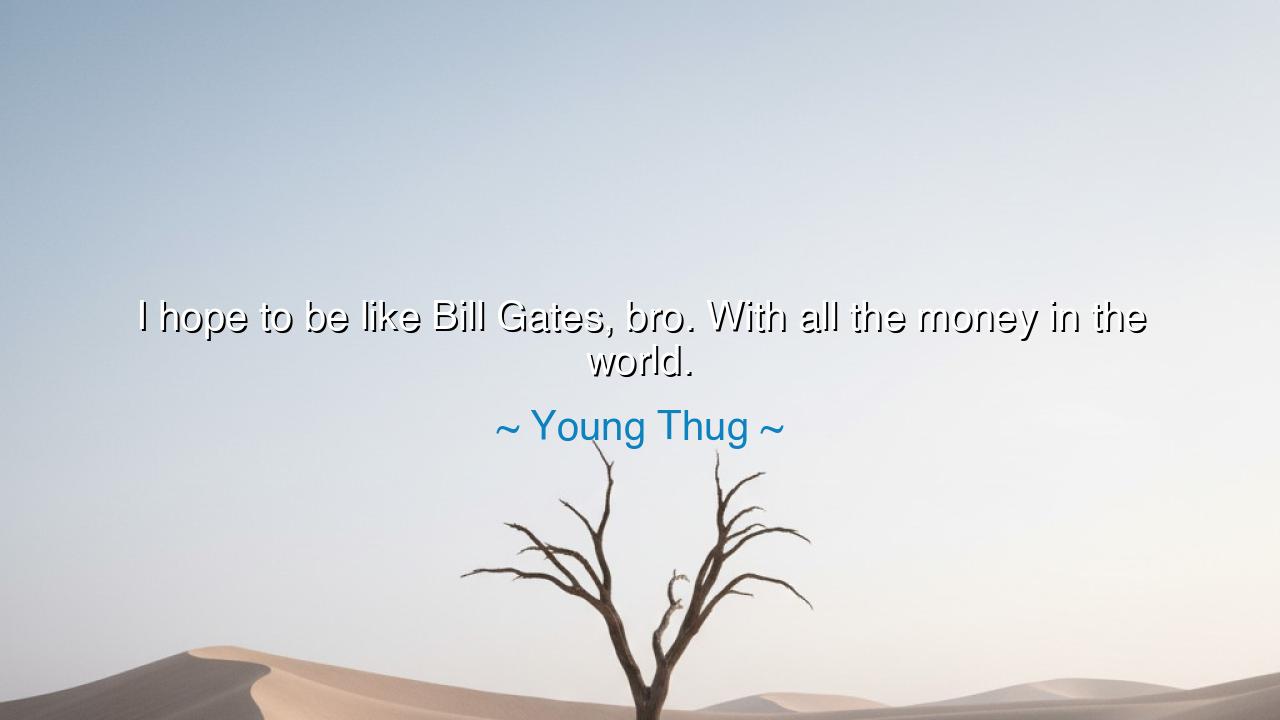
I hope to be like Bill Gates, bro. With all the money in the






"I hope to be like Bill Gates, bro. With all the money in the world." – Young Thug
In this bold and unguarded declaration, Young Thug, the artist of fearless self-expression, reveals the timeless hunger of the human soul — the yearning not merely for wealth, but for power, independence, and creation. His words, though clothed in the language of modern ambition, carry an ancient echo: the desire to transcend limitation, to master one’s destiny, to build something vast and enduring. When he says, “I hope to be like Bill Gates,” he does not merely speak of riches; he speaks of the freedom that comes from mastery, the freedom to shape life according to one’s own vision.
The origin of this quote lies in the modern age’s worship of innovation and entrepreneurship. Bill Gates, co-founder of Microsoft, stands as a symbol of intellect turned into influence, of vision turned into empire. To aspire to be like him is not only to covet wealth, but to covet impact — to wield creativity so powerfully that it changes the fabric of the world. For the ancient kings sought gold and dominion, but the modern creator seeks knowledge and the ability to reshape reality through it. Thus, when Young Thug speaks this hope aloud, he speaks the dream of all who would rise from nothing — the dream to turn imagination into immortality.
But beneath this longing lies a deeper lesson. For wealth alone, ungoverned by wisdom, becomes a chain instead of a key. History is rich with those who gained all and lost themselves — kings who ruled nations yet were conquered by greed, emperors who built monuments but died hollow. Yet it also remembers those who turned their riches into service, transforming material gain into spiritual abundance. Bill Gates, in the latter years of his life, has devoted his fortune to healing the sick, feeding the hungry, and uplifting the forgotten. Thus, the truest wealth is not what is hoarded, but what is shared.
Consider the story of Croesus, the fabled king of Lydia, once thought to be the richest man in the world. His gold dazzled the nations, and his name became synonymous with opulence. Yet when the oracle warned him that his empire would fall if he waged war, he mistook his own fortune for favor and fell into ruin. His downfall became legend — a warning that riches without foresight invite destruction. The wise learn from his tale that to aspire to greatness is noble, but to ground that greatness in virtue is divine.
In Young Thug’s words, there also breathes the voice of his generation — a generation born from struggle, seeking liberation through success. His desire to “have all the money in the world” is not mere greed, but the cry of one who has known scarcity and wishes never to bow to it again. It is the hunger of the artist who would lift his people as he lifts himself, transforming pain into prosperity. Ambition, when purified by gratitude and guided by purpose, becomes not vanity, but victory — the spirit of creation itself.
Yet one must remember: true wealth lies not only in possession, but in peace. To have “all the money in the world” but no wisdom, no love, no rest, is to be rich in shadow and poor in soul. The ancients taught that fortune is a river — unpredictable, unstoppable, ever-flowing — and the wise learn to sail upon it, not to dam it. Bill Gates and






AAdministratorAdministrator
Welcome, honored guests. Please leave a comment, we will respond soon